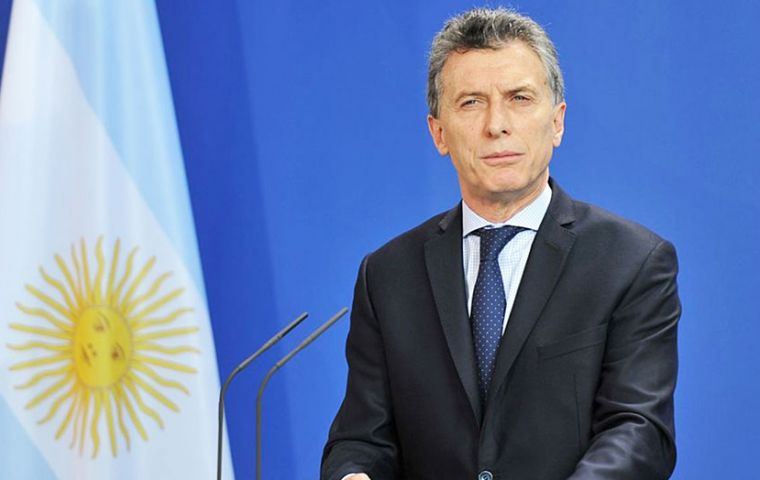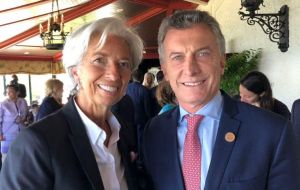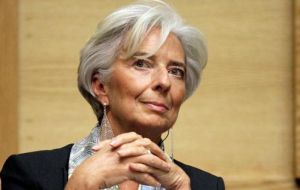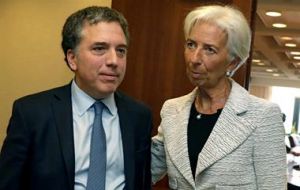MercoPress. South Atlantic News Agency
Macri addresses the nation; IMF pledges more support but Peso falls 7%, a record 34 to the US dollar
 “We have agreed with the IMF to advance all the necessary funds to guarantee compliance with the financial program next year,” Macri said in a televised address
“We have agreed with the IMF to advance all the necessary funds to guarantee compliance with the financial program next year,” Macri said in a televised address  “Over the last week we have seen new expressions of lack of confidence in the markets, specifically over our financing capacity in 2019,” Macri underlined
“Over the last week we have seen new expressions of lack of confidence in the markets, specifically over our financing capacity in 2019,” Macri underlined  IMF Managing Director Christine Lagarde responded by saying that the multi-lateral lender’s staff would “reexamine the phasing of the financial program”
IMF Managing Director Christine Lagarde responded by saying that the multi-lateral lender’s staff would “reexamine the phasing of the financial program”  She said that the “more adverse international market conditions” had not been “fully anticipated” when the IMF and Argentina reached the deal in June
She said that the “more adverse international market conditions” had not been “fully anticipated” when the IMF and Argentina reached the deal in June Argentina's Peso suffered its biggest one-day slide in almost three years on Wednesday after the central bank sold reserves for a second straight day and the president asked the International Monetary Fund for early release of standby funds.
The more than 7% fall in the Peso was its biggest one-day decline since the currency was allowed to float in 2015, prompting central bank interventions and investor concern that the third-largest Latin American economy may not meet its debt obligations .It closed at a record low of 34.10 Pesos per U.S. dollar and is down more than 45.3% against the greenback this year, prompting massive central bank interventions.
The run on the peso prompted Argentina to turn to the IMF for the US$ 50 billion credit line earlier this year. As part of the deal, Argentina’s government pledged to speed up plans to reduce the fiscal deficit. But given the peso’s continued depreciation, which makes the country’s dollar-denominated debts more expensive to pay, investors are increasingly concerned that the IMF help may not be enough.
“We have agreed with the International Monetary Fund to advance all the necessary funds to guarantee compliance with the financial program next year,” Macri said in a televised address on Wednesday. “This decision aims to eliminate any uncertainty.”
“Over the last week we have seen new expressions of lack of confidence in the markets, specifically over our financing capacity in 2019,” Macri said.
IMF Managing Director Christine Lagarde responded by saying in a statement that the multi-lateral lender’s staff would “reexamine the phasing of the financial program.” She said that the “more adverse international market conditions” had not been “fully anticipated” when the IMF and Argentina reached the deal in June.
“Authorities will be working to revise the government’s economic plan with a focus on better insulating Argentina from the recent shifts in global financial markets, including through stronger monetary and fiscal policies,” Lagarde said.
Argentina has US$ 24.9 billion in peso- and foreign currency-denominated debt payments due next year, according to official data.
Speaking to reporters after the IMF statement was issued, Minister Nicolas Dujovne said the government would reduce the size of its financing program, but did not provide specifics.
The peso’s decline has contributed to a jump in inflation, which hit a 12-month rate of 31.2% in July. In response, the central bank has hiked interest rates to 45% and sold more than US$ 13 billion in reserves, including US$ 300 million in an auction on Wednesday.
All that, combined with the budget cuts promised to the IMF that will slow down public works projects, is contributing to a recession that will result in an economic contraction of 1% this year, according to the government. That could hurt Macri’s re-election prospects in next year’s presidential race.
The June signing of the IMF deal reduced the need for costly bond market funding and briefly steadied the peso. The government has since announced more than US$ 2 billion in budget savings, a process Macri promised to continue.
“We will accompany the IMF support with all necessary fiscal efforts,” said Macri, who was elected in 2015 on a free market platform after eight years of deep government intervention in the economy under previous President Cristina Fernandez.
“I know that these tumultuous situations generate anxiety among many of you,” Macri said. “I understand this, and I want you to know I am making all decisions necessary to protect you.”
Argentina’s biggest labor group, the CGT, said on Wednesday it will call a 24-hour general strike on Sept. 25 to protest Macri’s belt-tightening measures. Two smaller union groupings said they will go on a 36-hour strike on Sept. 24 to protest the IMF, which many blame for the 2002 crisis.




Top Comments
Disclaimer & comment rules-

-

-

Read all commentsUnions going on strike is surely going to help the economy is it not ?
Aug 30th, 2018 - 10:07 am +2What is Argentina's alternative economic program if Macro falls? If you want his government to fail what is the alternative?
Aug 30th, 2018 - 07:45 pm +2Someone need a drunken sailor for a mission of national importance? I'm your man!
Aug 30th, 2018 - 08:46 pm +2Commenting for this story is now closed.
If you have a Facebook account, become a fan and comment on our Facebook Page!